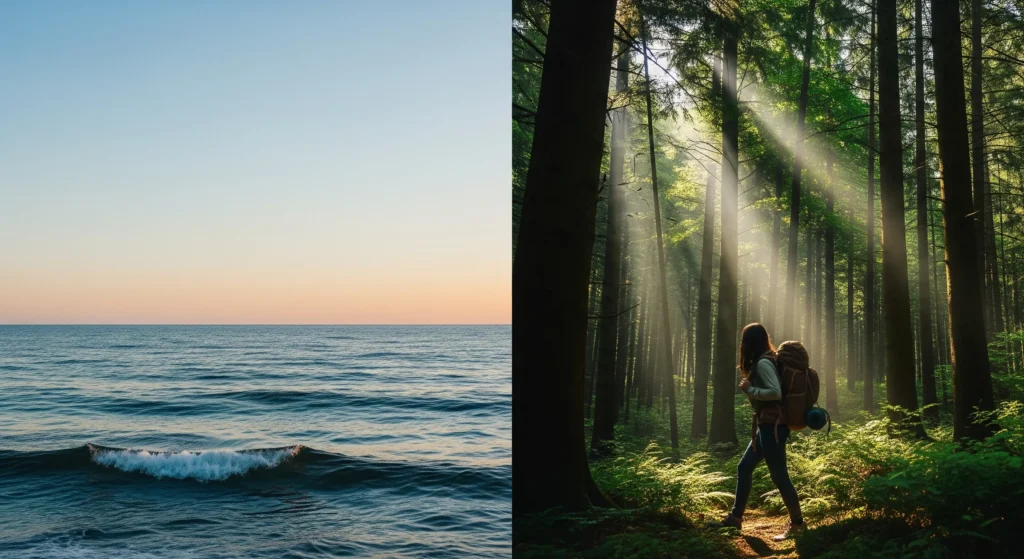6 Powerful Comparisons: Ocean Forests for Deep Relaxation

Introduction: Nature’s Healing Powers – Ocean vs. Forests
6 Compelling Comparisons: Ocean Forests for Relaxation
Nature has always been a potent healer. When we feel overwhelmed, anxious, or burned out, we usually want to take a walk on the beach or hide away in the forest. But which is more relaxing? The rhythmic sounds of ocean waves or the sound of leaves rustling in an old-growth forest?
Both ocean and forest environments provide sensory experiences that help trigger the body’s relaxation response. In either case, you’re in nature, you’re exposed to sounds, sights, and smells that help to reduce cortisol levels, lower heart rates, and promote clarity – all of which have been scientifically proven.
A 2020 study published in Frontiers in Psychology found that both forest and ocean environments significantly reduced stress and increased subjective well-being. Although Ocean Forest environments had similar effects on stress decreases, the way they worked was dependent on sensory input, emotional memory, and preference (Frontiers).
In this short blog post, we will explore 6 compelling examples comparing Ocean Forest environments to determine which are better for relaxation, including information helpful for relaxation, use cases, and affiliate products that you can consider to help enhance and support your wellness journey.
1: Soundscape: Gentle Wave vs. Whispering Leaves
Sound influences how we all relax physically. The ocean demonstrates a constant and rhythmic sound of gentleness. The waves crash and recede in a pattern that mirrors our natural breathing—slow, deep, and calming. These sounds are now seen as so soothing that many white noise machine apps utilize ocean sounds.
Forests possess a layered richness of sound. You hear birds, rustling leaves, the wind moving the branches, and the distant ticking of insects. These sounds can be much more complex and create a deeper relationship with our natural environment.
Actionable Tip:
If you are having trouble falling asleep or trying to focus, ocean sounds are likely to be better because of the repetitive, predictable rhythms. You may also purchase high-quality white noise machines, such as this ocean sound machine that provides the ability to create a calm sleep environment (found here)

2: Visual Relaxation: Blue Horizons vs. Green Canopies
The colors in nature directly impact our moods. The scientific color of water is blue, which is noted for being peaceful, deep, and introspective. Just gazing into the horizon where the sea meets the sky evokes a sense of calmness.
Forests are quite the opposite—shades of green. Colors stimulate the parasympathetic nervous system, which is responsible for relaxation. Color psychologists tell us, green is associated with growth, healing, and calm.
Actionable Tip:
If your stress originates from overstimulation and mental fatigue, opt for the forest. Proven to decrease anxiety and restore mental equilibrium, walking in the forest is known as “shinrin-yoku” in Japan.
Want to bring nature indoors? Try a visual therapy product like this LED forest projector. It showcases restive green forest patterns revealed in your room.
3: Smell and Breathing: Salty Air vs Earthy Smells
Our olfactory system (sense of smell) is closely tied to memory and emotion. Ocean air is infused with salt, negative ions, and moisture. Negative ions increase oxygen flow to the brain, which boosts alertness and your mood.
Forest air is heavy with phytoncides, natural plant-produced chemicals associated with powerful antibacterial properties and capable of exerting a number of immune-supporting effects. Breathing these earthy, woody smells can decrease anxiety and improve immune function.
Actionable Tip:
When subjected to many colds or reduced immunity, forest-based environments also communicate considerable therapeutic influences that exploit natural aromatic healing techniques; although, if you are unable to flee to the forest, you can replicate it with essential oil diffusers with pine, cedarwood, or sandalwood oils at home.
Recommendation:
After nature therapy, rejuvenate your cells and reward yourself with the relaxation experience of Advanced Mitochondrial Formula. It provides cellular energy support for both your cells and resets your mood.
4: Emotional Connection: Associations with Family Vacations vs. Walking in Nature
Emotional connections strongly influence how we engage with nature. For some, the ocean represents vacations, family trips, watching sunrises, and having fun – all positive associations that the brain can use for relaxation.
For others, a forest is spiritually tied to childhood experiences of hiking, exploring, and wandering. A forest has a sense of mystery, which can be perfect for doing deep thinking and journaling.
Actionable Tip:
If your need for relaxation has ties to emotion and nostalgia, select the environment that creates the best association with your happiest memories. Create your personal “relaxation zone” using scents, sights, and sounds to recreate the experiences of either environment.
5: Activity Choices: Walking, Weightlessness, Eating,
The two types of natural environments encourage different activities. At the ocean, for example, you swim from the beach, walk barefoot on the sand, relax on the beach, or just float (and enjoy the feeling of weightlessness) – all options enhance emotional and physical relaxation.
In the forest, there are more activity options; hiking, forest bathing, photography, and journaling are the most common. Walking through an area that is uneven (i.e., trail hiking) puts the body to work in balancing and focusing, which helps calm the mind.
Actionable Tip:
Select the environment that best matches your physical energy. If you are mentally drained but physically strong, swimming in the ocean or floating in the ocean is a great choice. If you want a little more gentle stimulation, then enjoy a leisurely walk in the forest with a keen sense of mindfulness.
Regardless of ocean or forest environment, you can experience both while either slow, purposeful breathing and/or several minutes of peaceful quiet or stillness. Use a portable timer or an app that has relaxing simplicity for the relaxation flow time.

6: Healing Functional Benefits: Physical versus Mental Renewal.
According to researchers, ocean environments almost immediately improve physical recovery by supporting decreased inflammation and improved sleep due to sensory immersion. Floating in saline water physiologically also reduces compressive stress on joints.
Forests are typically associated with mental renewal. Time spent in the presence of trees decreases symptoms of depression and increases memory retention by up to 20% (found through research at the University of Michigan).
Actionable Tip:
For physical exhaustion or pain, ocean-based recovery should be prioritized, and for mental exhaustion or anxiety, you should opt for forest-based environments or treatments.
Climbing on both functional benefits is better yet; a weekend in a forest followed by a day on the ocean is the ultimate detox retreat.
Frequently Asked Questions (FAQ)
Q1: Are ocean or forest sounds better for sleep?
Ocean sounds are more rhythmic, predictable, and therefore easier to align with pictures of sleep. That said, some find their calmness and relaxation in forest sounds because of their natural variation and realism.
Q2: Can nature therapy have an ongoing reduction in anxiety?
Yes. Consumption of nature… even if through video clips of nature or sound of nature… has been correlated with the body’s stress hormone cortisol reduction over time.
Q3: Is it safe to use Ocean Forests’ sound machines daily?
Of course. Sound machines that are intended for relaxing purposes are designed to be non-invasive and simply relax you. Just remember to keep the volume at comfortable levels.

Conclusion: Ocean Forests—Which Option Is Best For You?
To be honest, both Ocean Forest environments can be delightful and powerful pathways to relaxation. The best option will depend on your particular needs, whether these be physical, emotional, or mental. Ocean sounds will support sleep and physical recovery, while forests help restore focus and establish emotional equilibrium.
You should not feel you have to visit either location. With available technologies, you can create an ocean or forest environment in your own home: sound machines, LED projectors, aromatherapy oils, and supplements can provide a simulated ability for natural healing.
If you are coming down from a chaotic week or planning a well-deserved self-care ritual, discovering the positive relaxation benefits of Ocean Forests will help you live calmer, sleep deeper, and feel more connected to the world around you!
for deeper insights: 5 Benefits of Relaxation Sounds Rain – Focus & Sleep






